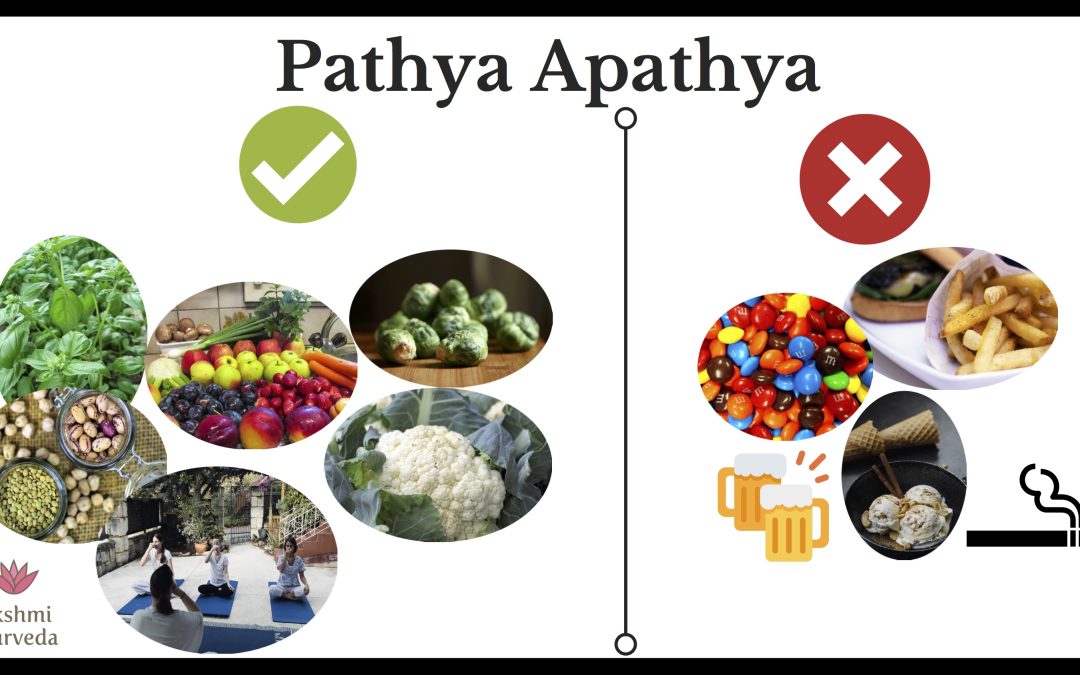Ayurveda is a traditional system of medicine that originated in India over 5,000 years ago. It is based on the belief that health and wellness depend on a delicate balance between the mind, body, and spirit. Ayurveda takes a holistic approach to healthcare, which means it focuses on the whole person rather than just treating the symptoms of a disease.
Ayurveda emphasizes the importance of maintaining balance in all aspects of life, including diet, exercise, sleep, and stress management. It uses a combination of natural therapies, including herbal medicines, massage, meditation, and yoga, to help individuals achieve and maintain optimal health with respect to pathya apathya concept.
In Ayurveda, each person is believed to have a unique constitution or dosha, that determines their physical and mental characteristics, as well as their susceptibility to certain diseases. The three doshas are called Vata, Pitta, and Kapha, and each one is associated with specific physical and emotional traits.
Overall, Ayurveda is a holistic approach to healthcare that emphasizes the importance of balance and harmony in all aspects of life. By focusing on the whole person, rather than just the symptoms of a disease, Ayurveda aims to help individuals achieve optimal health and well-being.
Food is considered a fundamental aspect of Ayurveda and plays a critical role in maintaining health and well-being. According to Ayurvedic principles, food is not only a source of physical nourishment but also affects the mind, emotions, and spirit.
Here are some of the critical principles of Ayurvedic nutrition that is pathya apathya:
- Eating according to your dosha: Ayurveda recognizes that each person has a unique constitution, or dosha, and recommends that individuals eat foods that balance their particular dosha. For example, Vata types may benefit from warm, nourishing foods, while Pitta types may do better with cooling, refreshing foods.
- Fresh, whole foods: Ayurveda emphasizes the importance of eating fresh[pathya], whole foods that are minimally processed. This includes fruits, vegetables, whole grains, legumes, nuts, and seeds.
- Mindful eating: Ayurveda encourages individuals to eat in a calm, peaceful environment and to be fully present during meals. This includes taking time to chew food thoroughly, savoring each bite, and avoiding distractions like television or phone screens.
- Food combining: Ayurveda also emphasizes the importance of proper food combining, which involves eating foods that are compatible with one another. For example, Ayurveda recommends avoiding combining dairy with sour or acidic foods, as this can create digestive problems[apathya].
- Spices and herbs: Ayurveda also recommends the use of spices and herbs to enhance the flavor and therapeutic properties of food. Many spices and herbs have specific health benefits, such as turmeric, which is anti-inflammatory, and ginger, which aids digestion.
Altogether, Ayurvedic nutrition emphasizes the importance of eating whole, fresh foods that are appropriate for one’s dosha, and being mindful and intentional during meals. By following these principles, individuals can support their physical, mental, and emotional health through their diet.
Pathya – Favorable
In Ayurveda, the concept of pathya refers to dietary and lifestyle guidelines that promote health and prevent disease. The word “pathya” literally means “that which is beneficial” in Sanskrit.
The pathya concept emphasizes the importance of individualized treatment plans that take into account a person’s unique constitution, or dosha, as well as any imbalances or health concerns they may have. Pathya recommendations may vary depending on the individual, their current state of health, and the season or climate.
- Avoiding incompatible foods: Ayurveda also recommends avoiding incompatible food combinations, such as consuming milk and sour fruits together or consuming milk and fish together, which can create digestive problems.
- Eating seasonally: Ayurveda recommends eating foods that are in season and appropriate for the local climate. For example, in the winter, warm, nourishing foods like soups and stews are recommended.
- Lifestyle modifications: In addition to dietary recommendations, also recommends lifestyle modifications to support optimal health. This may include stress-reducing practices like meditation and yoga, getting enough sleep, and engaging in regular physical activity.
Apathya – Unfavorable
The concept of apathya refers to dietary and lifestyle habits that are considered harmful or detrimental to health. The word “apathya” literally means “that which is not beneficial” in Sanskrit.
Here are some of the general principles of apathya food habits as per:
- Processed and junk foods: Ayurveda recommends avoiding processed and junk foods, which are typically high in calories, unhealthy fats, and refined carbohydrates. These foods can contribute to obesity, diabetes, and other chronic health conditions.
- Incompatible food combinations: As mentioned earlier, Ayurveda recommends avoiding incompatible food combinations, such as consuming milk and sour fruits together, which can create digestive problems.
- Excessive or inadequate intake of certain foods: Ayurveda also advises against excessive or inadequate intake of certain foods. For example, excessive consumption of spicy or fried foods can aggravate Pitta dosha, while inadequate intake of healthy fats can lead to dry skin and other health issues[apathya].
- Eating when not hungry: Ayurveda recommends eating when hungry and avoiding eating when not hungry. This helps to ensure that the body is able to properly digest and assimilate the nutrients from food.
- Overeating and undereating: Ayurveda also advises against overeating and undereating. Overeating can lead to digestive problems, while undereating can lead to nutritional deficiencies and other health issues.
